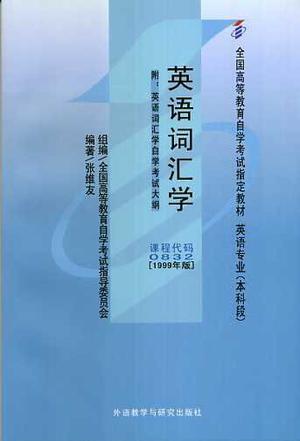
英语词汇学
外语教学与研究出版社 / 张维友 编
9787560011509
¥6.00 ¥12.90
八成新 考试教育
发布人说:书中有大量笔记
English Lexicology
CONTENTS
Introduction
Chapter 1 Basic Concepts of Word and Vocabulary
1.1 What Is a Word
1.2 Sound and Meaning
1.3 Sound and Form
1.4 Vocabulary
1.5 Classification of Words
1.5.1 Basic Word Stock and Nonbasic Vocabulary
1.5.2 Content Words and Functional Words
1.5.3 Native Words and Borrowed Words
Chapter 2 The Development of the English Vocabulary
2.1 The Indo-European Language Family
2.2 A Historical Overview of the English Vocabulary
2.2.1 Old English (450-1150)
2.2.2 Middle English (1150-1500)
2.2.3 Modern English (1500-up to now)
2.3 Growth of Present-day English Vocabulary
2.4 Modes of Vocabulary Development
Chapter 3 Word Formation One
3.1 Morphemes
3.2 Allomorphs
3.3 Types of Morphemes
3.3.1 Free Morphemes
3.3.2 Bound Morphemes
3.4 Root and Stem
Chapter 4 Word Formation Two
4.1 Affixation
4.1.1 Prefixation
4.1.2 Suffixation
4.2 Compounding
4.2.1 Characteristics of Compounds
4.2.2 Formation of Compounds
4.3 Conversion
4.4 Blending
4.5 Clipping
4.6 Acronymy
4.6.1 Initialisms
4.6.2 Acronyms
4.7 Back-formation
4.8 Words from Proper Names
Chapter 5 Word Meaning
5.1 The Meaning of “Meaning”
5.1.1 Reference
5.1.2 Concept
5.1.3 Sense
5.2 Motivation
5.2.1 Onomatopoeic Motivation
5.2.2 Morphological Motivation
5.2.3 Semantic Motivation
5.2.4 Etymological Motivation
5.3 Types of Meaning
5.3.1 Grammatical Meaning and Lexical Meaning
5.3.2 Conceptual Meaning and Associative Meaning
Chapter 6 Sense Relations and Semantic Field
6.1 Polysemy
6.1.1 Two Approaches to Polysemy
6.1.2 Two Processes of Development
6.2 Homonymy
6.2.1 Types of Homonyms
6.2.2 Origins of Homonyms
6.2.3 Differentiation of Homonyms from Polysemant
6.2.4 Rhetoric Features of Homonyms
6.3 Synonymy
6.3.1 Definition of Synonyms
6.3.2 Types of Synonyms
6.3.3 Sources of Synonyms
6.3.4 Discrimination of Antonyms
6.4 Antonymy
6.4.1 Types of Antonyms
6.4.2 Some of the Characteristics of Antonyms
6.4.3 The Use of Antonyms
6.5 Hyponymy
6.6 Semantic Field
Chapter 7 Changes in Word Meaning
7.1 Types of Changes
7.1.1 Extension
7.1.2 Narrowing
7.1.3 Elevation
7.1.4 Degradation
7.2 Causes of Changes
7.2.1 Extra-linguistic Factors
7.2.2 Linguistic Factors
Chapter 8 Meaning and Context
8.1 Types of Context
8.1.1 Extra-linguistic Context
8.1.2 Linguistic Context
8.2 The Role of Context
8.2.1 Elimination of Ambiguity
8.2.2 Indication of Referents
8.2.3 Provision of Clues for Inferring Word-meaning
Chapter 9 English Idioms
9.1 Characteristics of Idioms
9.1.1 Semantic Unity
9.1.2 Structural Stability
9.2 Classification of Idioms
9.2.1 Idioms Nominal in Nature
9.2.2 Idioms Adjectival in Nature
9.2.3 Idioms Verbal in Nature
9.2.4 Idioms Adverbial in Nature
9.2.5 Sentence Idioms
9.3 Use of Idioms
9.3.1 Stylistic Features
9.3.2 Rhetorical Features
9.3.3 Variations of Idioms
Chapter 10 English Dictionaries
10.1 Types of Dictionaries
10.1.1 Monolingual and Bilingual Dictionaries
10.1.2 Linguistic and Encyclopedic Dictionaries
10.1.3 Unabridged, Desk and Pocket Dictionaries
10.1.4 Specialized Dictionaries
10.2 Use of Dictionaries
10.2.1 Choice of Dictionaries
10.2.2 Content of the Dictionary
10.2.3 Use of the Dictionary
10.3 Three Good General Dictionaries
10.3.1 Longman Dictionary of Contemporary English (LDCE) New Edition (1987)
10.3.2 Collins COBUILD English Language Dictionary (CCELD) (1987)
10.3.3 A Chinese-English Dictionary (Revised Edition ) (CED ) (1995)
Suggested Answers
Reference Books
CONTENTS
Introduction
Chapter 1 Basic Concepts of Word and Vocabulary
1.1 What Is a Word
1.2 Sound and Meaning
1.3 Sound and Form
1.4 Vocabulary
1.5 Classification of Words
1.5.1 Basic Word Stock and Nonbasic Vocabulary
1.5.2 Content Words and Functional Words
1.5.3 Native Words and Borrowed Words
Chapter 2 The Development of the English Vocabulary
2.1 The Indo-European Language Family
2.2 A Historical Overview of the English Vocabulary
2.2.1 Old English (450-1150)
2.2.2 Middle English (1150-1500)
2.2.3 Modern English (1500-up to now)
2.3 Growth of Present-day English Vocabulary
2.4 Modes of Vocabulary Development
Chapter 3 Word Formation One
3.1 Morphemes
3.2 Allomorphs
3.3 Types of Morphemes
3.3.1 Free Morphemes
3.3.2 Bound Morphemes
3.4 Root and Stem
Chapter 4 Word Formation Two
4.1 Affixation
4.1.1 Prefixation
4.1.2 Suffixation
4.2 Compounding
4.2.1 Characteristics of Compounds
4.2.2 Formation of Compounds
4.3 Conversion
4.4 Blending
4.5 Clipping
4.6 Acronymy
4.6.1 Initialisms
4.6.2 Acronyms
4.7 Back-formation
4.8 Words from Proper Names
Chapter 5 Word Meaning
5.1 The Meaning of “Meaning”
5.1.1 Reference
5.1.2 Concept
5.1.3 Sense
5.2 Motivation
5.2.1 Onomatopoeic Motivation
5.2.2 Morphological Motivation
5.2.3 Semantic Motivation
5.2.4 Etymological Motivation
5.3 Types of Meaning
5.3.1 Grammatical Meaning and Lexical Meaning
5.3.2 Conceptual Meaning and Associative Meaning
Chapter 6 Sense Relations and Semantic Field
6.1 Polysemy
6.1.1 Two Approaches to Polysemy
6.1.2 Two Processes of Development
6.2 Homonymy
6.2.1 Types of Homonyms
6.2.2 Origins of Homonyms
6.2.3 Differentiation of Homonyms from Polysemant
6.2.4 Rhetoric Features of Homonyms
6.3 Synonymy
6.3.1 Definition of Synonyms
6.3.2 Types of Synonyms
6.3.3 Sources of Synonyms
6.3.4 Discrimination of Antonyms
6.4 Antonymy
6.4.1 Types of Antonyms
6.4.2 Some of the Characteristics of Antonyms
6.4.3 The Use of Antonyms
6.5 Hyponymy
6.6 Semantic Field
Chapter 7 Changes in Word Meaning
7.1 Types of Changes
7.1.1 Extension
7.1.2 Narrowing
7.1.3 Elevation
7.1.4 Degradation
7.2 Causes of Changes
7.2.1 Extra-linguistic Factors
7.2.2 Linguistic Factors
Chapter 8 Meaning and Context
8.1 Types of Context
8.1.1 Extra-linguistic Context
8.1.2 Linguistic Context
8.2 The Role of Context
8.2.1 Elimination of Ambiguity
8.2.2 Indication of Referents
8.2.3 Provision of Clues for Inferring Word-meaning
Chapter 9 English Idioms
9.1 Characteristics of Idioms
9.1.1 Semantic Unity
9.1.2 Structural Stability
9.2 Classification of Idioms
9.2.1 Idioms Nominal in Nature
9.2.2 Idioms Adjectival in Nature
9.2.3 Idioms Verbal in Nature
9.2.4 Idioms Adverbial in Nature
9.2.5 Sentence Idioms
9.3 Use of Idioms
9.3.1 Stylistic Features
9.3.2 Rhetorical Features
9.3.3 Variations of Idioms
Chapter 10 English Dictionaries
10.1 Types of Dictionaries
10.1.1 Monolingual and Bilingual Dictionaries
10.1.2 Linguistic and Encyclopedic Dictionaries
10.1.3 Unabridged, Desk and Pocket Dictionaries
10.1.4 Specialized Dictionaries
10.2 Use of Dictionaries
10.2.1 Choice of Dictionaries
10.2.2 Content of the Dictionary
10.2.3 Use of the Dictionary
10.3 Three Good General Dictionaries
10.3.1 Longman Dictionary of Contemporary English (LDCE) New Edition (1987)
10.3.2 Collins COBUILD English Language Dictionary (CCELD) (1987)
10.3.3 A Chinese-English Dictionary (Revised Edition ) (CED ) (1995)
Suggested Answers
Reference Books


 川公网安备51019002007191
川公网安备51019002007191